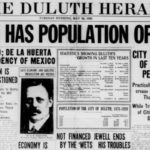Come on Duluth, pull your socks up!
Looking at Duluth in isolation, it has shrunk by 20 percent since 1960. In real terms, Duluth netted a population loss far greater when viewed in a regional context that accounts for the modest growth rates of Fargo, Rochester and Sioux Falls cited in the article. Had Duluth kept pace with those cities since 1960, Duluth would today have a population of 300,000. A nice sized, comfortable metro city.
Why doesn’t Duluth work?
Recommended Links:
Leave a Comment
Only registered members can post a comment , Login / Register Here













12 Comments
dulutherati
about 4 years agoJacob Jacobson
about 4 years agoDave Sorensen
about 4 years agoKodiak
about 4 years agosecretseasons
about 4 years agoKodiak
about 4 years agoKarl Schuettler
about 4 years agoKodiak
about 4 years agosecretseasons
about 4 years agoDave Sorensen
about 4 years agoKarl Schuettler
about 4 years agoKodiak
about 4 years ago